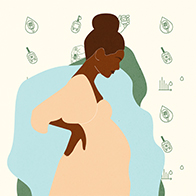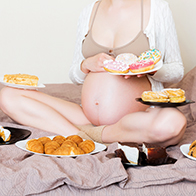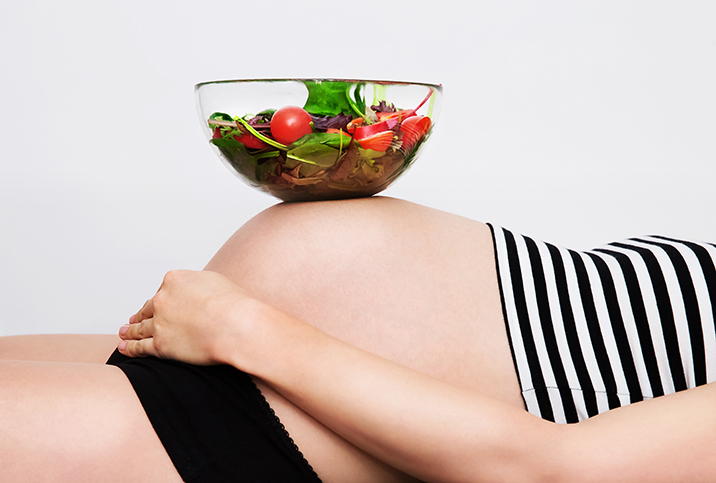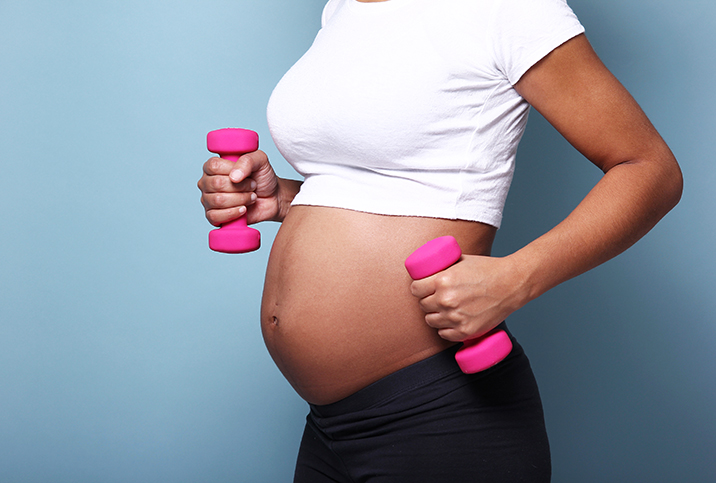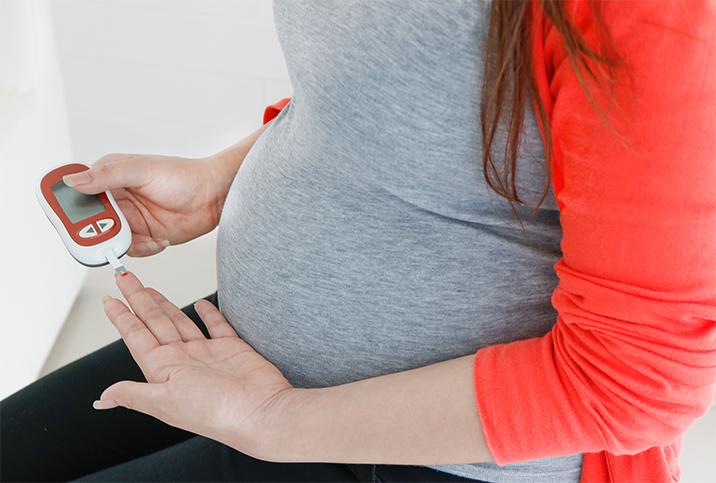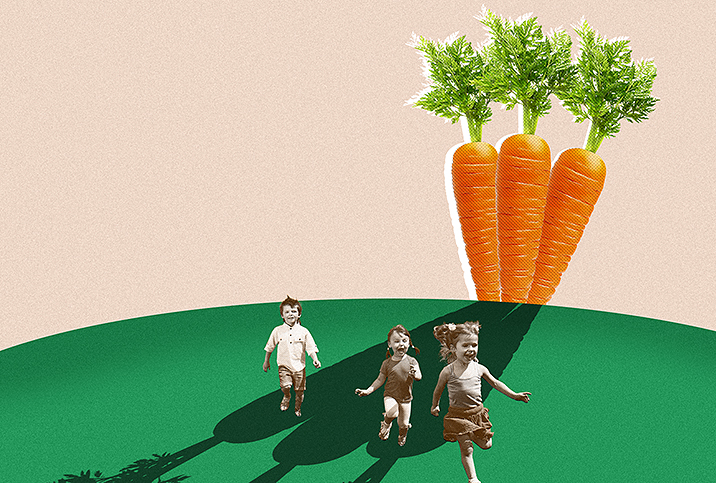The Effect of Pregnancy Cravings on Your Kids' Food Preferences
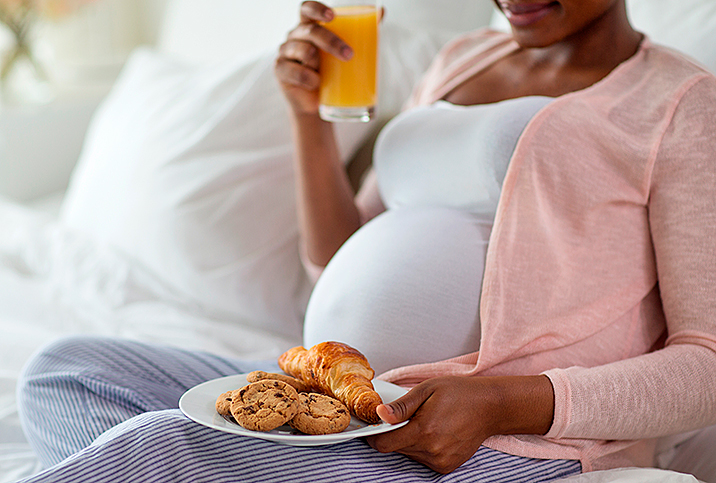
Pickles and ice cream, hot Cheetos drizzled in extra hot sauce, potato chips and dark chocolate…weird food combinations and insatiable cravings seem to be a foundational part of the pregnancy experience. And when your little one falls in love with Taco Bell's Fire Sauce at first taste (which you kept stocked in your purse for those "must-have" moments during pregnancy), it's hard not to wonder if you passed down your love of all-things-spicy to your offspring before he was even born.
In a word, the answer to your dying question is, "Maybe." Babies start getting tastes of the food their mother consumes a few months into pregnancy. So if your go-to munchies included things like fruits, cookies and Starbucks Frappuccinos, your baby might just come out with a killer sweet tooth. But, as with most things, the connections between pregnancy cravings and your children's future food preferences aren't necessarily so cut-and-dried. Here's what you need to know.
When pregnant, your child 'eats' what you eat
As you likely know, your growing baby uses the nutrition from your own food consumption while nestled inside your uterus. It's one of the key reasons pregnant women are encouraged to eat healthful foods. By consuming a well-balanced diet of fruits, vegetables, lean proteins and whole grains, you're helping ensure you and your baby receive the vitamins, minerals and nutrients necessary to carry a baby to term.
Of course, your baby doesn't "eat" while inside you—rather, she receives nutrients through the umbilical cord. As such, you might think that without putting your baby's taste buds to work, your act of "eating for two" is purely transactional. You eat food, your body breaks it down into nutrients, and these nutrients are delivered to your baby through the umbilical cord. But really, there's more to it than that.
You see, your amniotic fluid takes on the flavor of the foods you eat while pregnant. And starting about midway through your pregnancy, your baby's taste buds start working, giving your child the chance to "test-drive" new flavors—specifically, the flavors that you're consuming.
"Around 21 weeks gestation, the child can begin tasting hints of what the mother is eating via the amniotic fluid surrounding the baby in utero," said Trista Best, R.D., M.P.H. "This may be an indicator that a mother's food cravings and food preferences while pregnant can impact a child's food preferences, either positively or negatively, later in life."
Exposure to flavors in utero influences young children's preferences
While this area of research is still fairly untapped and could use a deeper dive, there's evidence from several studies that a child's in utero exposure to strong flavors, like alcohol, anise, garlic, and carrot, makes a difference in how a child will respond to the same flavors later on. A 2019 review study published in the American Journal of Clinical Nutrition found that "fetal flavor exposure increases acceptance of similarly flavored foods when reexposed during infancy and potentially childhood."
The studies that have been done (not all of them on humans, mind you) also help show how this can be a positive or negative thing.
"Two studies showed that a mother's junk food cravings or habits during pregnancy impacted the child's food preferences, ultimately leading to obesity," Best shared. For instance, in one study researchers gave pregnant rats a "junk food diet" and found their offspring were more inclined to consume salty, sugary and fatty foods when compared to those who had been exposed to a healthy diet while gestating.
On the other hand, a healthy diet during pregnancy may impart an enjoyment of healthy foods in your baby. One small study in 2001 had mothers drink carrot juice in their last trimester and during the first two months of breastfeeding. As the women began to introduce solid foods to the babies, they gave their children cereal with water and cereal with carrot juice, and then ranked their infant's enjoyment of the food.
The results of the study indicated that "previously exposed infants exhibited fewer negative facial expressions while feeding the carrot-flavored cereal compared with the plain cereal….Moreover, those infants who were exposed to carrots prenatally were perceived by their mothers as enjoying the carrot-flavored cereal more compared with the plain cereal."
These results led the researchers to conclude that prenatal and postnatal exposure to a certain flavor enhanced the child's enjoyment of the flavor in solid foods.
One thing that hasn't been looked at very in-depth is where the biological role of pregnancy cravings comes from. In other words, is it simply the body's drive for more calories? Is it the mother's body's way of saying a specific nutrient is lacking? (Hard to justify when the cravings are for nutrient-poor foods like potato chips or ice cream.) Or is it, possibly, the baby's own genetics and needs influencing the mother's choices?
Regardless, you should focus on healthy foods
Eating a nutrient-rich diet while pregnant is already the go-to advice for expectant mothers, but beyond enjoying a healthy pregnancy, it could also offer your baby the building blocks for long-term healthy food choices.
"Ideally, each meal should include carbohydrates, fat, and protein from quality sources," Best said. "It can be easy to rely heavily on carbs while pregnant, especially those made with refined carbs. But this only leads to a spike in glucose that ultimately ends in a crash and lower energy."
While it may not quite "hit the spot" as much as pickles and ice cream, Best points to snacks like hummus and celery, whole fruit, whole grain cereals, oatmeal, and nuts and seeds as good options for expectant moms (and their little ones). And, of course, don't shy away from foods that kids traditionally love to hate, like broccoli, spinach and peas. Including these types of green vegetables on a regular basis may make them more palatable to your baby once he starts tasting "real food."
Oops, your pregnancy was filled with junk
Pregnancy is a stressful, hard time. And if you just couldn't seem to get your fridge in order during your pregnancy, don't assume all is lost and that your child is destined to become addicted to fast food or sweets. In fact, the same 2019 study that found babies were more inclined to appreciate the flavors they were exposed to in utero, also noted the correlation between flavors babies were exposed to in breast milk.
So if you're breastfeeding your baby, go ahead and jump on the healthy-eating bandwagon! Your breast milk can also impart food flavors to your child, making her more likely to appreciate whatever you're chowing down on.
'Allowing children to take part in the food preparation process can help children with temperament-related picky eating to feel as though they have a sense of control in their food choices.'
And, of course, don't stop with food exposure as time goes on and your baby gets older. "Studies show that picky eating is associated with children being both underweight and overweight," Best said. "Allowing children to take part in the food preparation process can help children with temperament-related picky eating to feel as though they have a sense of control in their food choices. Focusing on the nutrient-dense foods that the child will eat is important in that they provide a source of essential nutrients from an otherwise void diet."
And in that light, Best suggests providing young children with healthier alternatives to popular snacks as a way to acknowledge the child's craving for something sweet or salty while providing key nutrients. For instance, you could switch out an ice cream cone for a whole milk yogurt parfait topped with fresh fruit.
Really, though, this suggestion works just as well for a pregnant mom as it does for a toddler. It may be important to acknowledge and make allowances for your pregnancy cravings (however weird or unhealthy they may be—pregnancy is a weird time), but look for the healthiest solutions you can, as often as you can. You'll appreciate the nutrition you're providing for yourself and your child, and you'll be setting your baby up for good future habits, right from the very beginning.







